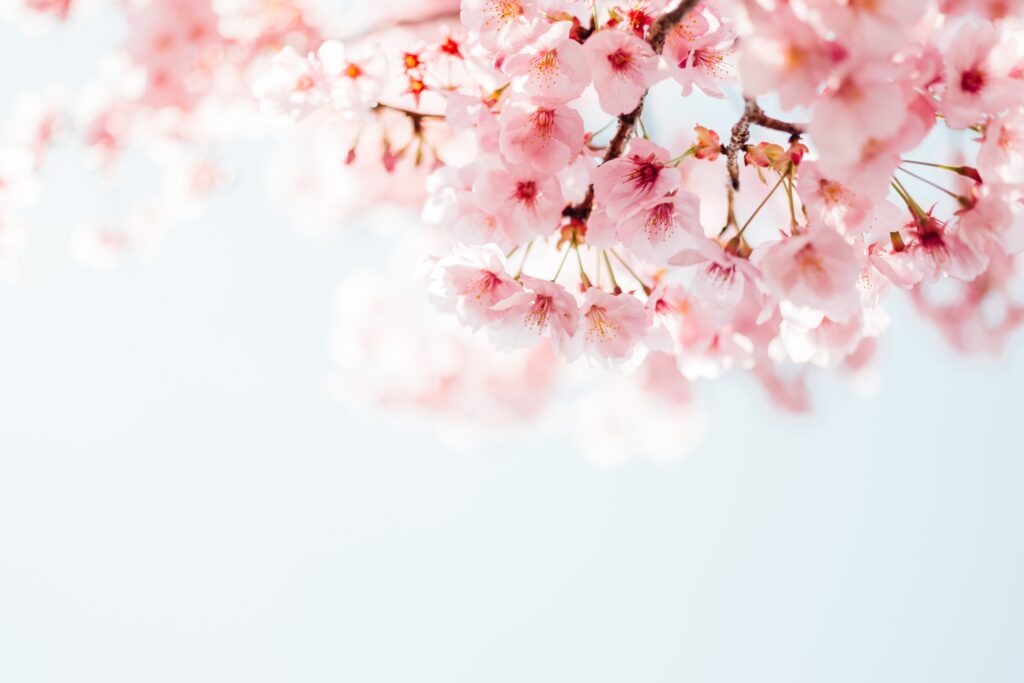
Oubaitori, a significant principle deeply rooted in Japanese culture, embodies the spirit of not comparing oneself to others. Taking inspiration from the world of flowers, the four ‘kanji’ ( logographic Chinese characters used in the older form of Japanese writing) making up the word each represent a different flower: cherry, apricot, peach, and plum. Each one blossoms beautifully but differently, often growing close together but harmoniously co-existing; they do not compete for the beauty of their blossoms or the taste of their fruits.
Embracing Individuality and Inner Growth
In the fast-paced and interconnected world we live in, it is easy to fall into the trap of comparing ourselves to others. Japanese culture, however promotes a valuable principle directed expressly at resisting this temptation. Deeply rooted in concepts such as “jiko jitsugen” (self-realization) and “ikigai” (finding purpose), Oubaitori emphasises the importance of focusing on personal growth, embracing individuality, and finding contentment within oneself. By understanding and applying this, we can cultivate a healthier mindset and lead more fulfilling lives.
The Dangers of Comparison:
Constantly comparing ourselves to others can have detrimental effects on our mental and emotional well-being. Comparison often leads to feelings of inadequacy, low self-esteem, and dissatisfaction. In a society driven by achievements and external validation, it becomes crucial to step away from the cycle of comparison and seek a more balanced perspective on self-worth. Remember:
Comparison is the thief of joy.
Theodore Roosevelt
Embracing Individuality:
Oubaitori encourages us to embrace our uniqueness and celebrate our own journey. It recognizes that each person has a distinct set of strengths, weaknesses, experiences, and aspirations. By appreciating this individuality, we can focus on developing our own talents, pursuing our passions, and cultivating our personal growth without the distraction of comparison.
Cultivating Self-Awareness:
Embracing the principle of Oubaitori requires the cultivation of self-awareness. It involves understanding our own values, desires and strengths, and aligning our actions with our authentic selves. Through practices such as meditation, introspection, and journaling, we can deepen our self-awareness and foster a stronger sense of identity, freeing ourselves from the need for external validation.
Fostering Collaboration and Community:
By shifting our focus from comparison to collaboration, we can foster a supportive and harmonious community. Oubaitori emphasizes working together and appreciating the contributions of others, rather than viewing them as rivals or competitors. Embracing this mindset encourages cooperation, empathy, and the recognition that everyone’s journey is unique. By celebrating the successes of others and offering support, we create an environment that nurtures growth and collective well-being.
Finding Contentment Within:
The principle of Oubaitori promotes finding contentment and satisfaction from within. It encourages individuals to set their own standards of success and define their own happiness, rather than seeking external validation or chasing after societal expectations. By focusing on personal growth, self-acceptance, and gratitude for what we have, we can cultivate a sense of fulfilment that is independent of comparison.
In Summary:
In a world filled with social media, the pressures of society, and the constant urge to measure up to others, the Japanese principle of Oubaitori offers a valuable lesson. By embracing individuality, fostering self-awareness, and focusing on personal growth and contentment, we can break free from the cycle of comparison and cultivate a healthier, more fulfilling life journey. We should remember that our worth lies in who we are and how we grow, not in how we measure up to others. This article on Psychology-Spot goes into more detail, for those who would like to follow up.
If you have enjoyed reading this post, you may be interested in my other related articles collected here, or my full set of wellbeing and personal development posts here.
An Oubaitori Checklist To Fight The Comparison Urge
When the temptation to compare yourself to others rears its head, try referring to the list below…
Cultivate Self-Awareness:
- Focus on developing a deeper understanding of your own values, strengths, and aspirations.
- Look to your own journey and growth; ask yourself why you are comparing yourself this person, what can you potentially learn from them instead?
Embrace Individuality:
- Celebrate your unique qualities, experiences, and perspectives.
- Recognize that everyone has their own path and strengths, and it’s not productive to compare yourself to them.
Set Personal Goals:
- Define your own goals and measures of success based on your values and aspirations.
- Avoid adopting societal or external standards as a benchmark for your own achievements.
Practice Gratitude:
- Cultivate gratitude for your own journey and the opportunities and experiences you have.
- Focus on appreciating what you have rather than longing for what others possess.
Foster Self-Compassion:
- Be kind to yourself and practice self-compassion.
- Understand that everyone has their own challenges and insecurities, and it’s important to treat yourself with understanding and acceptance.
Seek Inspiration, Not Comparison:
- Instead of comparing yourself to others, seek inspiration from their achievements or qualities.
- Use their success as motivation to learn and grow, without diminishing your own worth.
Cultivate Supportive Relationships:
- Surround yourself with a supportive community that values individuality and personal growth.
- Engage with people who encourage and uplift you, rather than those who foster competition or negative comparison.
By implementing these ideas, you can embrace your individuality, focus on personal growth, and cultivate a mindset that is free from the harmful cycle of comparison. Remember, your worth lies in your unique journey, and comparing yourself to others can hinder your progress and happiness.
